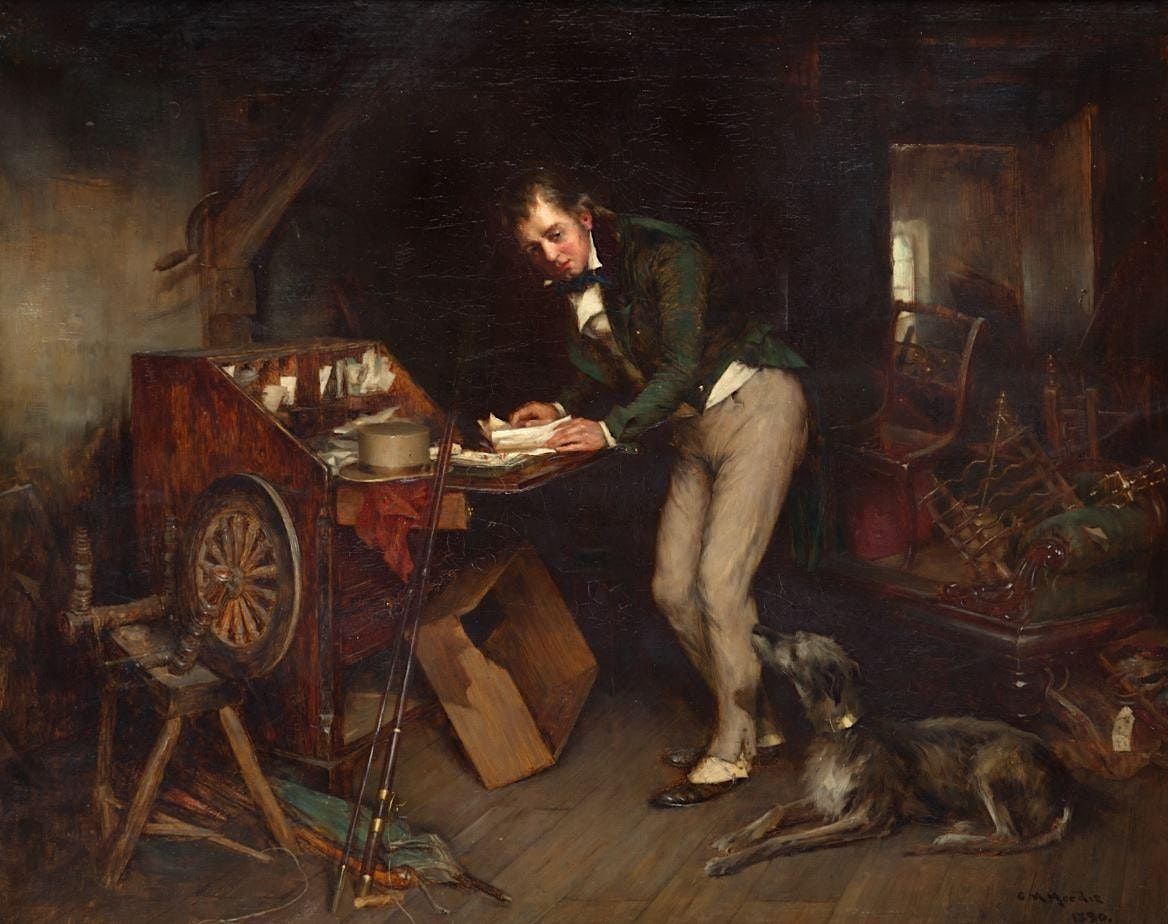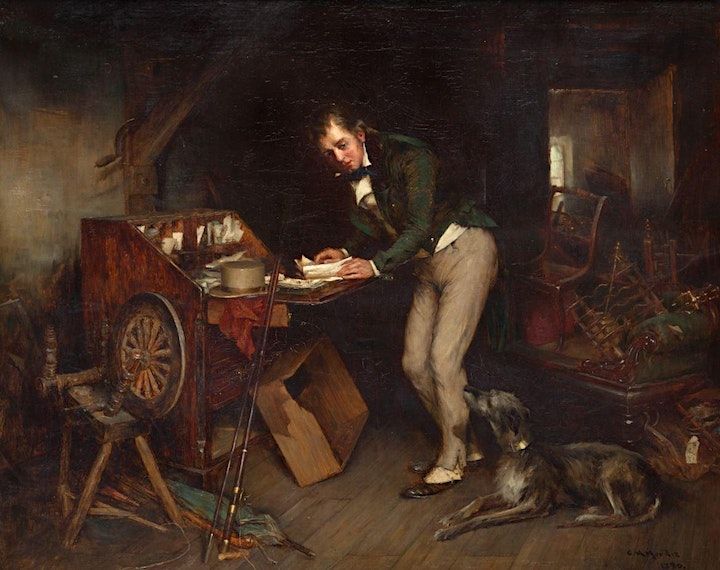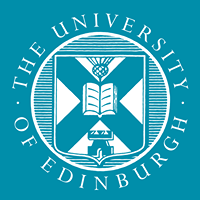Typographical Antiquities
Schedule
Fri Apr 21 2023 at 04:00 pm to 08:00 pm
Location
1.06 Project Room, 50 George Square | Edinburgh, SC

About this Event
Scottish Writing in the Nineteenth Century (SWINC) is delighted to welcome Professor Deidre Lynch (Harvard University), one of the world’s foremost scholars of eighteenth-, nineteenth- and twentieth-century British literature, to deliver her lecture ‘Walter Scott’s Typographical Antiquities’.
The lecture will be preceded by a round-table discussion chaired by Bob Irvine (University of Edinburgh), which will focus on antiquarianism, material texts and historicism, particularly manuscripts, digital texts and textual editing in the present moment.

Sir Walter Scott Finding the Manuscript of 'Waverley' in an Attic, Charles Martin Hardie (1858–1916)
Photo credit: The Abbotsford Trust
Walter Scott’s Typographical Antiquities
by Deidre Lynch
Building on recent work by Ina Ferris and Yohei Igarashi, this paper traces in the Waverley Novels and in Scott’s favourite among them, The Antiquary, especially, Scott’s bemused response to his contemporaries’ investigations of the history of the printed book.
It reconstructs his insights into the vexed relationship between the nascent disciplines of bibliography and book history on the one hand, and the protocols of modern print communication on the other.
At the opening of the nineteenth century, antiquarian aficionados of “blackletter learning” believed themselves to be paying homage to the printed codex and honouring its communicational efficacy. Others, however, surveyed their curious studies and their editions, transcriptions, and experiments with facsimile editions and traded their bibliomania for bibliophobia, accusing them of interrupting the smooth cultural transfer of the past and unleashing into the public sphere so many zombie books (Thomas Carlyle, for instance, sputtered about “Dead sham-living books”).
This early book history was as associated with illegibility and communicational impasses as it was associated with reading. As Scott recognised, the study of typographical antiquities produced an identity crisis for the book, disaggregating its parts and impairing its integrity. It made it harder to think of the book as being all of a piece, and by unsettling books’ relationship to presence and the present unsettled the study of the past.
Speaker bios
Deidre Lynch is Ernest Bernbaum Professor of English Literature at Harvard University, and also, in recognition of her excellence in undergraduate teaching, Harvard College Professor from 2021 to 2026. Her prize-winning books include The Economy of Character: Novels, Market Culture, and the Business of Inner Meaning (1998), Loving Literature: A Cultural History (2015), the edited collections Cultural Institutions of the Novel (1996, co-edited with William B. Warner), Janeites: Austen’s Disciples and Devotees (2000), and, most recently, The Unfinished Book (2021, co-edited with Alexandra Gillespie).
She is currently completing Paper Slips: A Literary and Media History of Scrap on the tension between the loose leaf and the whole book that is hardwired into modern cultures of paper and print. This project traces how practices centred on scraps — collaging, commonplacing, recycling, scavenging, gleaning — can call into question the primacy of the notions of originality and authorial property that usually organise our accounts of modern literature and art.
Bob Irvine is Reader in Scottish Literature at the University of Edinburgh. He has edited Robert Burns, Selected Poems and Songs for Oxford World’s Classics (2013); Prince Otto for the New Edinburgh Edition of the Works of Robert Louis Stevenson (2014), and Annals of the Parish for the Edinburgh Edition of the Works of John Galt (2020).
He is currently working on another volume for the Galt edition, the companion novels The Member and The Radical; and a critical edition of The Lord of the Isles for the Edinburgh Edition of Walter Scott’s Poetry.
Angela Esterhammer is Professor of English and Principal of Victoria College in the University of Toronto. Her book publications include The Romantic Performative: Language and Action in British and German Romanticism (Stanford UP, 2000); Romanticism and Improvisation, 1750-1850 (Cambridge UP, 2008), and most recently Print and Performance in the 1820s: Improvisation, Speculation, Identity (Cambridge UP, 2020).
Her current research interests include late-Romantic print culture, performance, periodicals, and fiction, and she is General Editor of the Edinburgh Edition of the Works of John Galt.
Emily Rohrbach is Associate Professor of English at Durham University, where she teaches and writes most often about poetics and futurity, the literary imagination of the book, and British Romanticism.
Her first book, Modernity's Mist: British Romanticism and the Poetics of Anticipation, was published by Fordham UP in 2016. With support from a 2022 Leverhulme Research Fellowship, she is currently completing Codex Poetics: Romantic Books and the Politics of Reading.
Nigel Leask is Regius Chair in English Language and Literature at the University of Glasgow. He has published widely on British and especially Scottish romantic literature and culture, with a special emphasis on orientalism and empire, travel writing and ‘improvement’, and the Gaelic world.
His most recent monograph is Stepping Westward: The Highland Tour 1720-1820 (Oxford 2020) which was shortlisted for the Saltire National Book Awards 2021. He is also co-editor (with Anne Dulau and John Bonehill) of Old Ways New Roads: Travel in Scotland 1720-1830 (Birlinn 2021), addressing the visual culture of the tour. He is a Fellow of the British Academy and the Royal Society of Edinburgh, and a Vice-President of the Association for Scottish Literary Studies.
Access and recording
Please note that this is a free, in-person event held on the University of Edinburgh campus. It will not be live streamed - tickets are for access to the venue. However, the event may be photographed and/or recorded and added to the University website afterwards. If you would prefer not to appear in any recordings, please contact us in advance or speak to us on the day. It's not a problem.
The event is organised by Scottish Writing in the Nineteenth Century (SWINC).
Find out more about SWINC on their website

Where is it happening?
1.06 Project Room, 50 George Square, University of Edinburgh, Edinburgh, United KingdomEvent Location & Nearby Stays:
GBP 0.00
